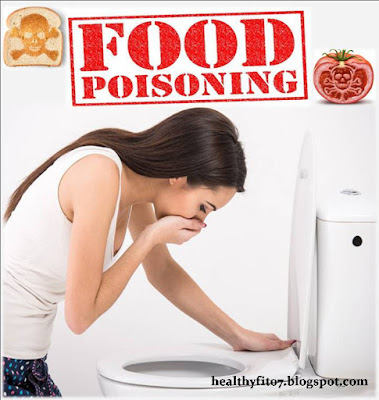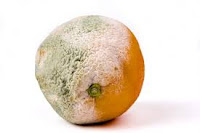 |
| FOOD POISONING |
Food poisoning can be unpredictable, but there are easy food
safety steps you can take to ensure that you and your family's tummy are safe.
Consumption of unhealthy food contaminated with pathogenic bacteria, viruses, or
parasites and foods containing chemical or natural toxins like poisonous
mushrooms can result in food-borne diseases.
In the United States, on an
average, 76 million cases of food poisoning and 5,000 associated deaths occur
each year. People with otherwise weakened immune systems like the elderly, the
children, and pregnant women tend to be most vulnerable.
Here are 9 preventive measures that will help you fight foodborne
illnesses and stop food poisoning.
1.
FOOD SAFETY
WHEN SHOPPING
Start shopping wisely. You must keep in mind a few things while
shopping for your daily food items. Start following food safety measures at the
grocery store.
v
Buy the
frozen and refrigerated products last; this will keep the perishable products
cold for a longer time.
v
Put the raw
meat in separate a bag from other foods and store them properly immediately
after bringing them home.
v
Be carefully
while choosing foods. Poor storage and packaging can affect the quality and
safety of some food.
v
Do not buy
food package with broken seal or dent, swollen or leaking cans or containers.
v
Check the packaging dates. Do not buy outdated food packets.
Check that if the foods advised to be kept chilled or frozen have
been left out of the refrigerator or freezer.
2.
WASH, WASH,
WASH
You need to wash all the food products you bring home, even if you
are going to peel them before you eat. Though washing does not always eliminate
your risk as the pathogens can get inside. Always before cooking or cleaning
carefully, wash your hands. Once again wash hands after touching raw meat to
avoid contamination. Do not get over scared with contaminated products, because
by doing so you may compromise the nutrition value of foods like spinach,
tomatoes.
3.
SEPARATE RAW
FROM READY
§
Avoid
putting cooked meat or fish back onto the same dish or container that held the
raw meat, until you are sure that the container is washed.
§
It is better
to use a different set of utensils and cutting boards for assembling
ready-to-eat dishes and for preparing raw meats and fish. This will check spreading of foodborne bacteria due to cross-contamination.
§
It is good
to wash the sink after using it to clean raw meats.
§
Thoroughly
clean, all utensils and dishes if they have been exposed to raw meat, poultry,
fish, or eggs.
§
Never thaw
frozen food on warm water, as doing so the outermost layer gets warm too
quickly, promoting bacteria growth.
4.
AVOID RAW
EGGS
One of the most common causes of food poisoning is eggs. Since
1990, eggs have been linked to 352 cases of food poisoning outbreaks due to the
presence of salmonella bacteria. Do not buy cracked or dirty eggs. The chance of
eating a raw egg is extremely rare, but it sometimes happens that you are
consuming it unintentionally without your knowing it. You consume raw egg when
you taking a nibble of raw cookie dough or licking the same spoon used to stir
the cake batter and this can be hazardous.
5.
KEEP YOUR
EYE ON THE TEMPERATURE
v
While
cooking raw meat do not trust what you looks like, as it could be deceiving. It
is better to check the internal temperature of all meats with a food
thermometer instead of trusting a browned chicken breast. Keep a kitchen
thermometer in your reach when cooking. The temperature of chicken and turkey
should reach 165˚F; steaks, 145˚F; and hamburgers, 160˚F to make it safe to eat
without food poisoning. The optimum temperature for bacteria to incubate and
multiply the fastest is between 40˚ and 140˚F, so make sure that cold food
remains cold and that cooked food is hot enough to kill these pathogens.
v
Put the
Leftovers or perishable food in your refrigerator within 2 hours. Freeze your
food at a temperature below 40˚F, and when reheat cooked leftover food until it
reaches at least 165˚F. To keep you and your family safe from food poisoning
due to any bacterial growth reheat the cooked food to steaming to ensure any
pathogen that may have multiplied, gets killed. Never eat fish, meat, and
poultry that have been frozen uncooked for more than 1 to 2 days.
6.
WHEN IN
DOUBT, THROW IT OUT
Leftover foods are one of the major sources of food poisoning.
Leftovers food may still be a source of toxin due to foodborne bacteria even
if you have proper care during purchasing, cleaned it thoroughly, and cooked
everything properly.
Using the “2-2-4” rule of thumb recommended in this case:
·
Do not leave
the food out in open for more than 2 hours;
·
Use
containers less than 2 inches deep while freezing your food; and
·
Try to consume
all your refrigerated leftover foods before 4 days, and don’t eat thereafter.
·
Do not risk
your health eating food that you doubt. Contaminated food may not smell or look
bad, but if you suspect that food was left in open for too long, there is
change of contamination through flies or insects, or has been in the fridge for
longer than 4 days, just throw it out and don’t even taste it.
7.
BE EXTRA
CAREFUL WHEN PREGNANT

Food safety becomes even more important when you are pregnant and
eating for two (you and your baby), this is because the immune system gets
weakened naturally during pregnancy. Infections that seem mild and mostly
ignored in pregnant women can be fatal to an unborn baby. Listeriosis is an
infectious food poisoning caused by eating foods contaminated with the Listeria
monocytogenes bacteria. 1600 people are reported to be infected with
listeriosis each year, and about 260 of them lead to death. The infection in
pregnant women can lead to miscarriage, premature delivery, a serious infection
of the newborn, or even stillbirth. A listeria bacterium generally found in
soil, water, and animals, including poultry and cattle. Raw milk and foods made
from raw milk can also be contaminated with these bacteria. Listeria also
thrives in food processing plants and contaminates soft cheeses, deli meats and
other varieties of processed meats. Listeria causes easy to overlook mild
symptoms in pregnant women, but if ignored and left untreated, it can develop
severe fetal abnormalities or even miscarriage.
Pregnant women should be much more careful to avoid food poisoning
and follow all the stated food-preparation and storage measures. Further
pregnant women avoid eating soft cheese and processed meat.
8.
FOOD SAFETY
FOR YOUR KIDS
v
Teach your
children make a habit to wash their hands thoroughly and especially before
eating food, after using the bathroom, and after touching raw food. Use soap
and warm water and scrub for at least 15 seconds.
v
Never feed
honey to children less than 12 months old. Honey may contain spores of
Clostridium botulinum, which may result in botulism poisoning.
v
If you are a
mother and take care of young children, make a habit of washing your hands.
Dispose of the diapers carefully so that spread of bacteria never occurs.
9.
DINE OUT
WITH CAUTION
Most of the case of food poisoning found to occur when we travel
or eat outside.
§
Try to eat
only hot or freshly cooked food while traveling or dining out. Avoid those
dishes that contain raw vegetables or unpeeled fruit.
§
Carry
drinking water with yourself or buy a sealed pack of pretreated water.
§
Do not eat
wild mushrooms while dining out or at home.
§
All
restaurants require displaying health inspection information in their front
windows so that before a consumer even enters the restaurant they can make sure
food safety is given a priority by the restaurant. Be your own inspector when food safety is not easily available in the locality you live. The cleanness
and hygienic condition of the kitchen can be probably ascertained by checking
the restroom if the bathroom is filthy. Also, note the cleanliness of the
staff, inform the manager. Keep a note if the dishes served are properly washed
and clean.
§
Avoid
ordering meat and dairy products when you are dining out.












Comments